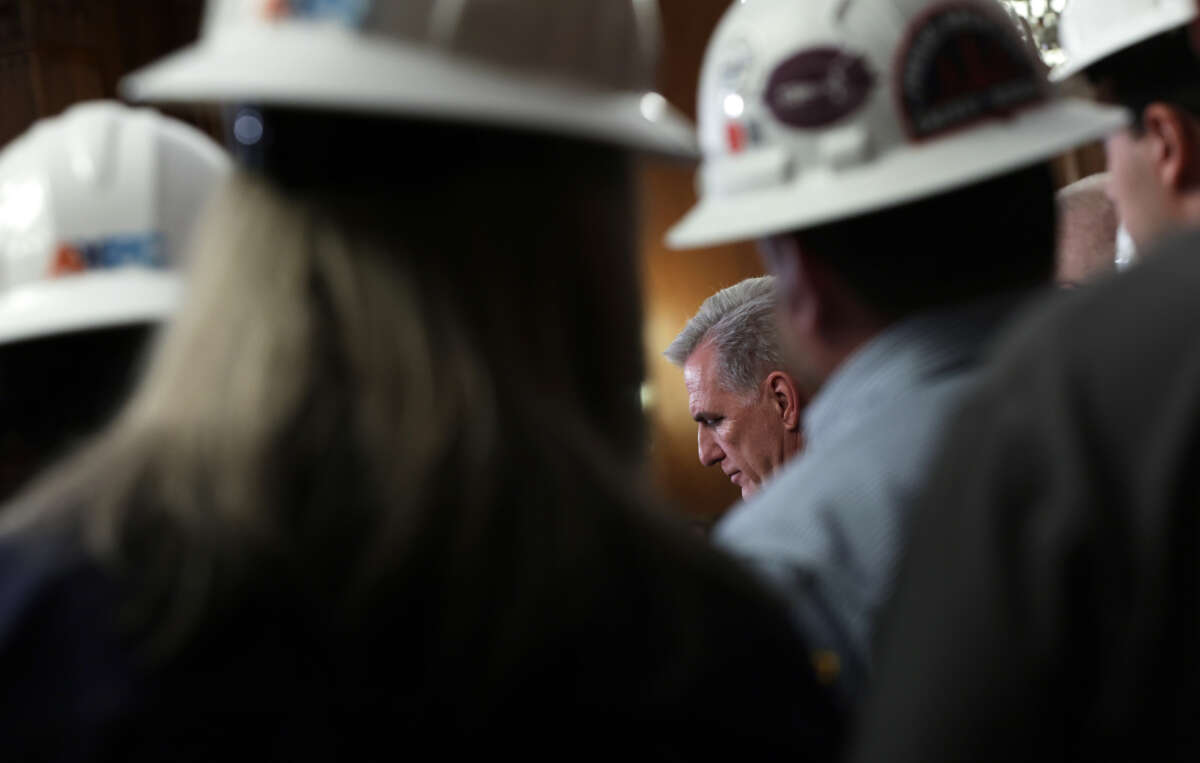Last week, the Intergovernmental Panel on Climate Change (IPCC) released a sobering report aimed in part at policy makers, saying in no uncertain terms that there is a “rapidly closing window” to act on climate in order to avert the worst impacts of the climate crisis. Just 10 days later, Republicans in the House passed a bill aimed at slamming the window shut.
On Thursday, the House passed H.R. 1, a legislative amalgam of fossil fuel favors that opponents say may as well have been written by the industry — if not outright written by lobbyists, as similar proposals have been. The sweeping bill is the first major bill passed by the Republican-controlled House since their takeover this year, and takes aim at a host of environmental regulations in the National Environmental Policy Act (NEPA) and the Inflation Reduction Act (IRA) that would set back what little progress the U.S. has made on climate policy in recent years.
The Lower Energy Costs Act, dubbed the Polluters Over People Act by Democrats, passed 225 to 204 in a largely party line vote. One Republican, Rep. Brian Fitzpatrick (Pennsylvania) voted against it, while four Democrats voted in favor of it, Representatives Henry Cuellar (Texas), Jared Golden (Maine), Vicente Gonzalez (Texas) and Marie Gluesenkamp Perez (Washington). Cuellar and Gonzalez are two of the top 50 recipients of fossil fuel money in the House, a Public Citizen report released Thursday found; 45 of the other top 50 recipients are Republicans.
The bill targets several regulations that the fossil fuel industry has long wanted to erode. It would overturn President Joe Biden’s efforts to stop the Keystone XL pipeline, while prohibiting presidents from banning fracking and requiring the federal government to hold additional lease sales to allow fossil fuel companies to drill on federal lands.
It would weaken NEPA by shortening the period of public comment on publicly-funded projects like pipelines and mines — a provision that climate advocates say is crucial to the nation’s oldest major environmental law — and make it harder for groups to bring lawsuits against the projects. Key parts of the IRA, like an anti-pollution program aimed at reducing emissions of methane, an extremely potent greenhouse gas, would be repealed under the proposal.
Progressives and climate advocates have slammed Republicans for the bill, saying that it is nothing but a major fossil fuel handout. Over 100 organizations have signed letters urging lawmakers not to pass the bill.
“This bill is another giveaway to the fossil fuel and mining industries. It’s even more egregious than what Republicans tried to ram through when [Donald] Trump was president,” said senior public lands policy specialist for the Center for Biological Diversity Paulo Lopes. “Republicans want to force agencies to ignore dangerous, climate-killing fossil fuel projects that will harm environmental justice communities the most.”
Sen. Ed Markey (D-Massachusetts) derided Republicans for continuing to champion socialism for the rich and rugged capitalism for the poor.
“Day in and day out, you hear Republicans and their acolytes deriding socialism on Fox News. They don’t like the Green New Deal — it’s socialism. Well, what do you call tax breaks for the oil, gas and coal industry for 100 years? Give us that socialism for wind and solar… and we will bury the coal and oil industry here in the United States and around the world,” Markey said at a press conference on Thursday. “That is the revolution which we need.”
Though Senate Majority Leader Chuck Schumer (D-New York) has said that the bill would be “dead on arrival” in the Senate, climate advocates raised concerns that Democrats may see a window to work on “bipartisan” legislation, like when Democratic leaders secretly worked on a similar bill with coal baron Sen. Joe Manchin (D-West Virginia) that was narrowly defeated after progressives and activists raised an uproar.
Food and Water Watch policy director Jim Walsh said that Schumer should make it clear that he would not pull such a maneuver again, deriding Republicans’ bill as a Big Oil “wish list.”
“The Senate rejected that dirty deal last year after hundreds of organizations and dozens of lawmakers spoke out against the ploy to dress up fossil fuel giveaways as so-called ‘permitting reform,’” Walsh said in a statement. “It is time for Senator Schumer to make it clear that he will not negotiate any deals that undermine core public health laws for the sake of fossil fuel industry profits.”
Media that fights fascism
Truthout is funded almost entirely by readers — that’s why we can speak truth to power and cut against the mainstream narrative. But independent journalists at Truthout face mounting political repression under Trump.
We rely on your support to survive McCarthyist censorship. Please make a tax-deductible one-time or monthly donation.
